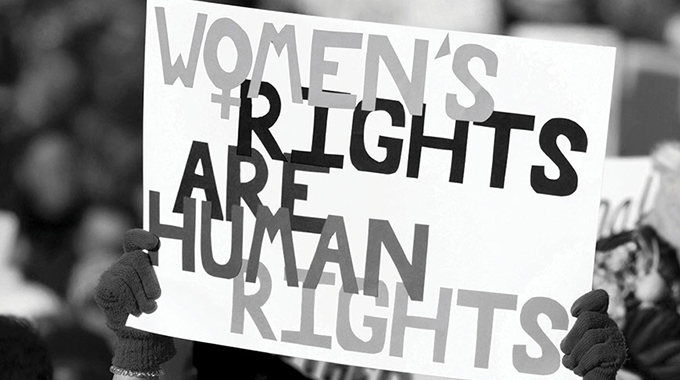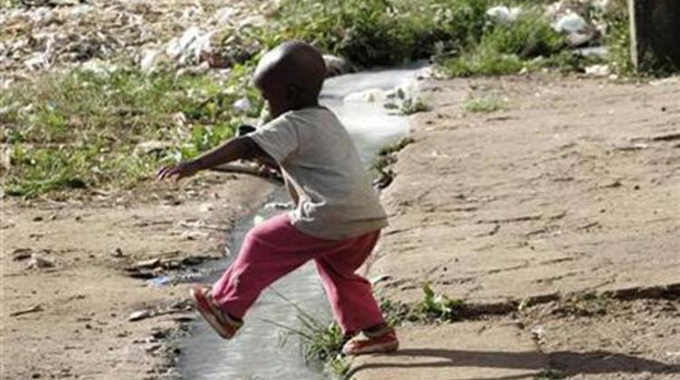Safeguarding health, rights of women and girls

Simiso Mlevu Staff Writer
Covid-19 is like a toxic broth in which all the world’s ills are simmering and being dished out as countless societal challenges.
The pandemic has increased women, girls and young women’s duties of running households at a time most have depleted income and are finding it hard to eke out a living, especially in Sub-Saharan Africa.
In various ways, women, especially from marginalised communities and those with disabilities have been affected by the secondary impacts of the outbreak. Some marginalised women have also faced challenges in accessing sexual and reproductive health services like contraception to prevent unplanned pregnancies, as movement restrictions due to Covid-19 lockdowns affect them.
Sadly, Covid-19 comes at a time the world was making commendable strides in ending unmet need for family planning. For instance, because of Covid-19, supply chain disruptions are limiting availability of contraceptives in many places, with stock-outs of many contraceptive methods anticipated in lowest income countries.
This can easily reverse the gains made in ending unmet need for contraception since the 1994 International Conference on Population and Development (ICPD). In the last 25 years, the number of women using modern contraceptive methods almost doubled from 470 million in 1990 to 840 million in 2018.
The Covid-19 pandemic resulted in lockdowns which pushed up the number of gender-based violence cases (GBV). In all its forms, GBV has been tearing the societal fabric of many communities, women and girls being the most affected, if reported cases to the police and organisations like Musasa Project are anything to go by.
Economic stress on families due to the outbreak has put women and girls at greater risk of exploitation, child labour and gender-based violence.
With many developing countries facing huge challenges in meeting increasing health needs amid scarce financial resources as a result of Covid-19, governments and development partners are further strengthening their relationships and response mechanisms.
For instance, the United Nations Population Fund (UNFPA) yesterday released over $2,5 million to support the Government of Zimbabwe and various implementing partners to continue providing quality sexual reproductive health and Gender Based Violence services during the global Covid-19 pandemic.
This is a welcome move as the funds are meant to ensure the continuation in the provision of sexual reproductive health services, including GBV prevention and services for survivors during the Covid-19-induced lockdown. Speaking at a media briefing to commemorate World Population Day, UNFPA Deputy Country Representative Ms Gulnara Kadrykulova said the Covid-19 pandemic that affected the lives of many people and pushed up incidences of GBV.
The theme for this year’s World Population Day is “Putting the Breaks on Covid-19: How to Safeguard the Health and Rights of Women and Girls Now?”
“Initiatives to end GBV and harmful cultural practices have also been affected,” said Ms Kadrykulova. “Globally, Covid-19 continues to disrupt efforts to end harmful practices, including averting GBV.
“In Zimbabwe, working with various partners and under the leadership of the Ministry of Women Affairs, Community, Small and Medium Enterprise Development (MOWCSMED), UNFPA has identified current challenges within the Covid-19 context and tailored appropriate interventions.”
As lead of the GBV sub cluster in Zimbabwe, UNFPA is working with the MOWCSMED to ensure GBV services are among essential services.
This is so that survivors and GBV service providers are free to seek for services and provide services respectively during the Covid-19 lockdown.
UNFPA says it has also provided support in scaling up of the mobile One-Stop-Centres model for multi-sectorial service delivery, including health, police and legal support. The UN agency has also assisted in equipping all static and mobile Gender Based Violence (One-Stop-Centres, safe shelters and safe spaces) with Covid-19 hygiene supplies and infection control measures.
Furthermore, they have provided support for escorting survivors to higher level of care, including those with suspicious symptoms to Covid-19 dedicated response health facilities through a shuttle service.
Covid-19 movement restrictions have resulted in difficulties getting transport to access services for many. Additionally, UNFPA has aided the scaling up GBV hotline capacity for remote psychosocial support.
Moreover, it has supported community based information dissemination through mediums such as social media, community and national radio on Covid-19 prevention and where survivors can continue to access GBV services during this lockdown period.
UNFPA has also supported capacity building of inter-cluster frontline responders on GBV services and referrals, including within quarantine facilities. In Zimbabwe, GBV and harmful practices are undoing a lot of gains made in development, and the Covid-19 pandemic is worsening the situation.
The 2015, Zimbabwe Demographic Health Survey (ZDHS) confirmed that violence against women is rife and affects all women, regardless of geographic location, wealth or education.
At least 35 percent of women and girls, 15 to 49 years, have experienced some form of GBV at least once in their lifetime.
Minister of Women Affairs, Community, Small and Medium Enterprise Development Dr Sithembiso Nyoni said: “While the Covid-19 pandemic is affecting everyone, everywhere, but the impact is not the same as the pandemic is deepening existing inequalities and vulnerabilities, particularly for women and girls.”
Dr Nyoni said existing gender and other inequalities have been exacerbated, with women and girls facing increased threats of gender-based violence, challenges in accessing sexual, reproductive health services, which also include pre- and post-natal care.
“Economic stressors can increase tensions within intimate relationships and disrupt gender roles; resulting in men failing to fulfil their gender roles, as providers, resorting to violence as an outlet,” she pointed out.
She said the Zimbabwe Gender Commission was on high alert and working with civil society to ensure women, including those with disabilities, have information on gender-based violence. Dr Nyoni said they have also increased the number of One-Stop-Centres and aim to have one in each province. Findings from the State of the World Population 2020 report show that all over the world, Zimbabwe included, tens of thousands of girls are, on a daily basis, having their health, rights and futures stolen from them through the prevalence of GBV and harmful cultural practices.
“The Covid-19 crisis has taken a staggering toll on people, communities and economies everywhere. Yet not everyone is affected equally, and as we so often see, women and girls tend to suffer most,” UNFPA Executive Director Dr Natalia Kanem.
“The impact of Covid-19 will likely hamper global efforts to achieve the three ‘zeros’ at the heart of our work at UNFPA — zero unmet need for contraception, zero preventable maternal deaths, and zero gender-based violence and harmful practices against women and girls — by 2030.
“UNFPA projects that the pandemic will cut global progress towards ending gender-based violence within this decade by at least one third.”
UNFPA and partners are supporting efforts to respond to GBV in humanitarian settings, including in climate change triggered emergencies — cyclone, drought and disease outbreaks like the current Covid-19 global pandemic.
Programmatic interventions aim at reducing vulnerabilities of women and girls, which exacerbate the risk of exposure to GBV in emergencies, and ensuring continuity of essential services.
Support includes ensuring that there is continuity in the provision and access to essential reproductive health services in order to reduce preventable maternal and neonatal deaths.
As part of measures to support the women and girls to maintain their dignity during the lockdown, the MOWCSMED distributed dignity kits to the National Training Centre, which is accommodating homeless women and girls. The Government department also distributed dignity kits to OSCs supported around the country.
In light of the impact of Covid-19, UNFPA has reprogrammed its work to support continuity of life-saving maternal health interventions.
UNFPA is supporting the Ministry of Health and Child Care with infection prevention and control sundries, personal protective equipment for health workers, equipment and sundries to support emergency obstetric and neonatal care. Support for efforts on strengthening psychosocial support for people affected or infected with Covid-19 continue to be provided.
Water buckets, liquid soap and sanitisers for hand hygiene for women in maternity waiting homes have been procured and distributed.
In addition, technical and financial support is being provided in the national Covid-19 response technical working groups. Efforts to ensuring availability of essential reproductive health commodities such as contraceptives continue to be supported.
“Sexual and reproductive health care is a right, and like pregnancies and child birth, human rights don’t stop for pandemics. Together, let’s put the brakes on Covid-19 and safeguard the health and rights of women and girls — now,” says Dr Kanem. UNFPA work in Zimbabwe on ending GBV is supported by the Governments of Britain, Ireland, Sweden and the European under the Health Development Fund.
The Governments of Ireland and Sweden also support the GBV365 National Programme. Support is also provided under the Spotlight Initiative to Eliminate Gender Based Violence by the European Union.









Comments